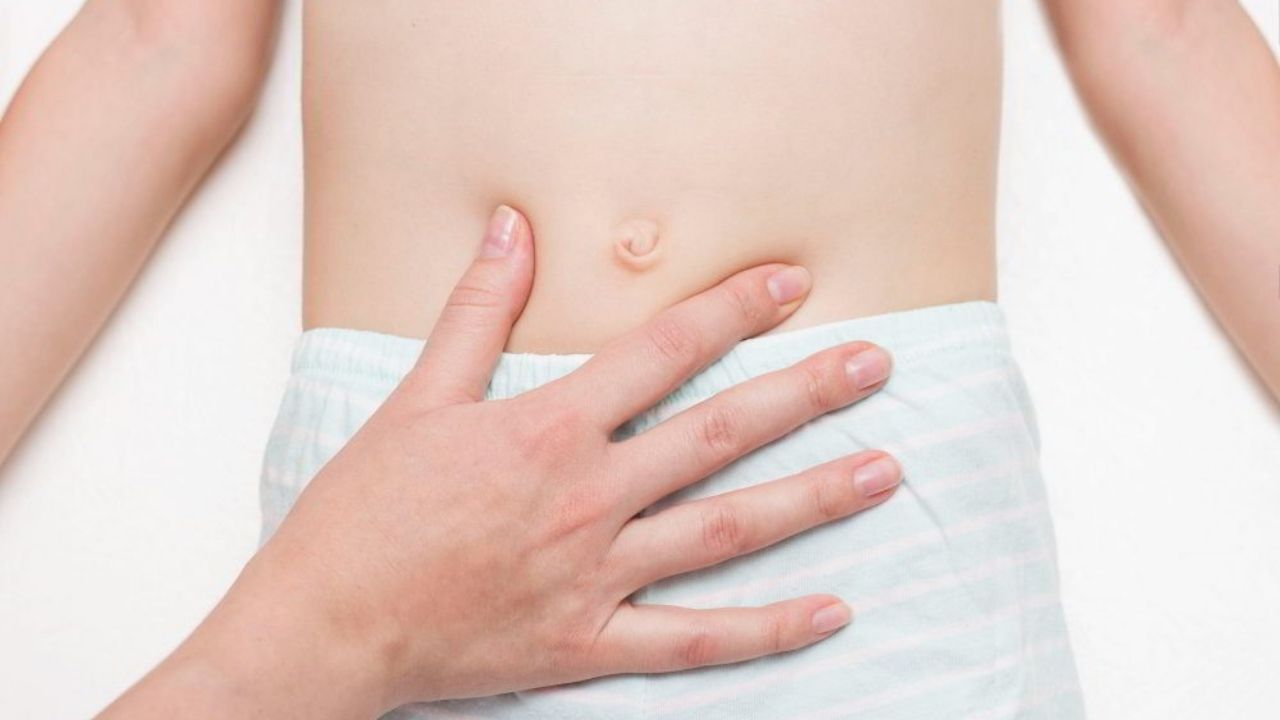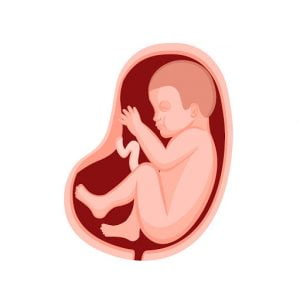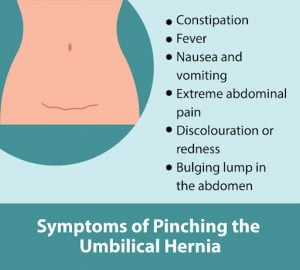Home > Blogs > General Surgery > What Are the Signs and Symptoms of Umbilical Hernia?
What Are the Signs and Symptoms of Umbilical Hernia?

New parents look forward to a milestone in healing their infant’s belly button. Then, within a week or two after delivery, the umbilical cord stump (cord that forms a connection between a mother and her fetus while in the womb) dries out properly and falls off, exposing the navel. However, a newborn’s belly button can cause concern when it feels hard or looks enlarged.
After birth, the intestines may push through this small opening and cause an umbilical hernia. Although adults can have it too, Umbilical hernias are more significant in newborns and infants younger than six months. Each year about 20 percent of babies are born with this condition.
How does umbilical hernia develop?
Adults may develop a hernia because of growing overweight and straining the abdominal area. It can also develop during or after pregnancy because of a long-lasting cough. However, some experts say that there is 0.08% of the risk for developing umbilical hernia during pregnancy.

Umbilical hernia mainly develops because the opening in the abdominal muscle that lets the umbilical cord pass-through cannot close completely. The problem is more common in babies than adults.
This condition is more likely to develop in babies born at a low weight or prematurely. The percentage of occurrence is same for both male and female gender. However, other conditions include:
- Frequent pregnancies
- The abdominal cavity containing excess fluid
- Abdominal surgery
- Having twins or triplets
Read More – What is Hernia Operation?
What are the signs and symptoms of an umbilical hernia?

If you develop umbilical hernia, the first thing you will notice is a lump in your navel area. It will appear more obvious when the infant cries, laughs, coughs, or goes to the toilet. However, the lump may shrink when a child is lying down and relaxing.
Moreover, in most conditions, umbilical hernias in babies are harmless and painless.
However, in adults, the hernia can be painful. The main symptom is swelling or bulging of the navel area which requires immediate surgical treatment.
In case you notice the below symptoms, you may need emergency medical treatment:
- The baby begins to vomit suddenly
- The child is in extreme pain
- The bulging part, i.e. in both children and adults, is swollen, tender or discoloured
Complications that arise because of the umbilical hernia
As such there is no threat of complications in infants and children. But there are cases of some complications in both adults and children when the abdominal tissue is trapped (incarcerated) and not able to get back into the abdominal cavity.
As a result of a hernia, it becomes impossible to push the intestines back into the abdominal. Thus, the body does not supply enough blood, leading to severe pain and even killing tissues. This may further lead to severe infection and increased risk of mortality.
Hence, umbilical hernia needs to be treated immediately. At the same time ensure to seek immediate help when you notice the symptoms of hernia that indicate strangulated or obstructed intestines. These symptoms include:
- Constipation
- Fever
- Nausea and vomiting
- Extreme abdominal pain
- Discolouration or redness
- Bulging lump in the abdomen
Read More – Do’s and Don’ts after Inguinal Hernia Surgery
Have queries or concern ?
What kind of doctor to approach when you grow a hernia?
It’s best to start with a primary care provider if you have a hernia. However, if the condition worsens and you need surgery to repair the hernia, you must look for a general surgeon.
Don’t wait to seek help even if you are not sure about having hernia. If ignored, hernia can grow darker, larger and painful over time that may lead to further complications. Getting it treated early can greatly increase the chance of successful surgery and better recovery.
Conclusion
Most cases of umbilical hernia in babies will get resolved on their own by age 3 or 4. However, speak with a near pediatrician if you think your baby may have an umbilical hernia. Seek emergency care if your baby is in pain or the bulge swells up further or gets discoloured.
Adults with a bulge in their abdomen should also seek medical advice. Hernia repair surgery has nowadays become a common procedure with high success rates. As a result, most children can return home with no complications the same day of the surgery. However, it is not something to ignore, so make sure you get it treated as soon as you notice its symptoms.
If you have any queries about umbilical hernia, its signs and symptoms, and treatment, connect to our experts now!
Patient Feedback
Great doctors, Good facilities, caring and helping staff. I recommend this hospital for day care services.
![]()
![]()
Sangram Shinde
All doctors r very good. There treatments is best. Other staff also good. The service of nurses is great...Hospital is always clean.
![]()
![]()
Vaishali Aitawade
All services provide by hospital are nice and on time. Doctors are polite and co-operative with patient.
![]()
![]()
Ankita Jagtap
All services provided by hospital is good. Hygiene maintained well.Even at night good care provided.
![]()
![]()


